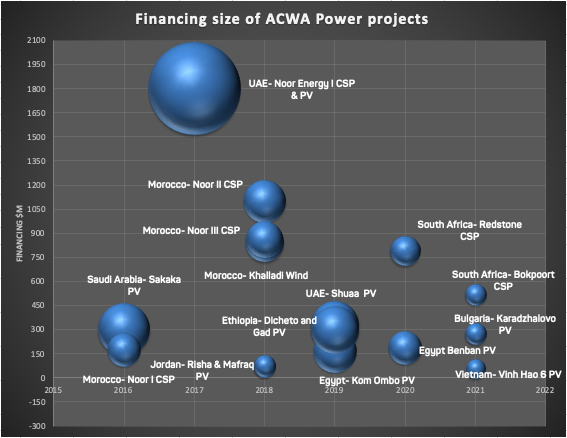Saudi Arabia’s new renewables giant
24 January 2020
Saudi Arabia has ambitious energy diversification targets, yet execution has been slow and the kingdom remains synonymous with petroleum. However, ACWA Power, a company backed by the public investment fund and Saudi investors, is helping the country become a leader in the renewable energy sector.
Gulf Monitor | Jessica Obeid | Renewable energy
Seeking security
Saudi Arabia is known for its large petroleum reserves, constituting 18% of the global proven reserves, according to OPEC, and ranks as the largest exporter of oil. While petroleum has traditionally dominated the kingdom’s energy markets, including power generation, energy security is a major concern for the sustainability of the sector.
Energy security is a matter of national security, driving policies, regulations, investments and foreign relations across the world. While the term is vague, it generally refers to the security of uninterrupted energy supply – and contrary to common belief, the risk of disruption in supply in petroleum-producing economies is quite significant.
Electricity consumption in the kingdom has been increasing at a significant rate, largely driven by population growth and industrial development. Climate change has also played a role, with temperature increases resulting in a higher demand for cooling in addition to water scarcity and subsidies. Electricity and fuel subsidies have resulted in cheap electricity tariffs, increasing wasteful consumption and pressure on the state budget. Growth in peak demand averaged 7.3% between 2005 and 2015, compared to an average of 5.5% in non-OECD countries. Reduction in subsidies and efficiency efforts in the past three years have decreased the demand growth rate, but it remains significant. Meanwhile, annual installed capacity growth has similarly averaged 7.7%.
The growing domestic electricity demand and the technologies in use have led to a retraction in the share of oil and an increase in the share of natural gas in power generation. Domestic production of the latter is insufficient to meet the rising need, requiring substantial investments in infrastructure and gas, and eliminating any future export potential while rendering the power sector more vulnerable. In light of this, diversification and investment in alternative energy sources, including renewables, are not only important to decarbonising the power sector and mitigating climate change – they will also be crucial to decreasing the sector’s vulnerabilities and enhancing energy security.
Slow start
Saudi Arabia has set ambitious renewable energy targets, yet implementation remains unmatched with aspiration, and the policies lag behind. The current power generation capacity stands at around 80 GW, and the peak demand in 2030 is forecasted at 130 GW. The kingdom has great potential for success with wind, photovoltaic (PV) systems and concentrated solar power (CSP) systems, and early last year announced a new target of 27.3 GW of renewable energy by 2023 and 58.7 GW of renewable capacity by 2030. The 2030 target includes 40 GW from solar PV, 16 GW from wind, and 2.7 GW from CSP. But only a few projects have been awarded or completed to date: the 300-MW Sakaka solar PV plant (currently online in its pilot phase), the 400-MW Dumat Al Jandal wind farm (under construction), and the 50-MW Waad El Shamal CSP plant (completed).
A giant in the making
Energy diversification differs across countries and regions. The changing energy scene, technological advancements and climate commitments are creating a new set of national challenges across the globe. Petroleum-producing economies, oil companies and sovereign wealth funds are diversifying their investment portfolios to reduce the risk of carbon taxes, stranded assets and long-lasting lower oil prices. Many are also attempting to rebrand themselves and transition to more diverse economies and more resilient business models.
But while Saudi Arabia’s brand remains tied to petroleum, Riyadh-headquartered ACWA Power, a private company operating in power and water desalination, is increasing its market share in the renewables segment. The company’s strategy seems to be entering new markets from early renewable deployment stages through medium- to large-scale utility projects in accordance with national energy plans. With shareholders including Saudi Public Investment Fund and the International Finance Corporation, ACWA Power is showcasing Saudi leadership in the global energy sector, with a renewable energy portfolio across nine countries: Bulgaria, Egypt, Ethiopia, Jordan, Morocco, Saudi Arabia, South Africa, the UAE and Vietnam. Earlier this month, the company signed a new agreement to develop a 240-MW wind power project in Azerbaijan.
The company has a renewable energy portfolio of around 20 projects and total installed capacity of 3,186 MW, amounting to $10.57bn and divided between solar PV, CSP and wind. Its largest generation capacity is in solar PV with 1,706 MW and financing of $2.28bn. Its highest financing portfolio is in CSP, with projects of 1,360 MW and totalling $8.1bn.
**UAE- Noor I CSP and PV project finance is $4.3bn, resized in the chart to optimise visualisation
Regional influencer
Morocco is on the forefront of diversification efforts in renewable energy, and ACWA Power has been a dominant player in the solar industry. It has developed the CSP and solar PV projects in the country totalling 802 MW, while its share of the 1,200-MW wind projects is only 120 MW. More players are gaining momentum in the sector as upcoming solar projects, totalling 420 MW, have recently been awarded to a consortium led by France’s EDF and UAE’s Masdar.
The players are more diverse in Egypt and Jordan. In Egypt, ACWA has developed 120 MW of the 1,800-MW Benban PV project and 200 MW of the Kom Ombo solar PV project. In Jordan, where renewable energy projects installed, planned or under development since 2011 total 1,560 MW, ACWA Power is a latecomer. There, the company has only developed two projects of 50 MW each: Mafraq and Risha in 2018 and 2019, respectively.
In the Gulf, the company is developing the 260-MW Shuaa PV and Noor Energy I in Dubai, which is the 4thphase of the 5-GW Mohammed Bin Rashid Al Maktoum. The project is a $4.3bn 950-MW plant of combined CSP and solar PV and is the world’s largest single-site CSP and single hybrid solar power plant. ACWA Power has also developed the 300-MW Sakaka PV project; the first utility-scale renewable energy plant in Saudi Arabia.
The company’s presence in South Africa remains low, with only 150 MW CSP of a total of approximately 1,500 MW of installed solar capacity. But in Ethiopia, the company is a significant player in a growing market, as it is developing two projects of 125 MW each – a large portion of the 350 MW in total existing solar energy projects – and the first two projects in the country implemented through the World Bank’s Scaling Solar project. The country’s plan is to implement between 1,000 MW and 1,350 MW in solar projects by 2024.
ACWA’s success is not only a sign of Saudi Arabia’s commitment to branching out of petroleum – it also shows the kingdom’s ability to command a significant presence in renewables. With its record low prices and a rapidly extending reach, the company’s renewable energy arm is making a name for itself as a key player in the Gulf region and beyond.
Jessica Obeid is an independent energy consultant and academy associate at Chatham House, where she previously served as a resident fellow in the Energy, Environment and Resources Department. She previously worked as chief energy engineer at the UN Development Programme in Beirut. Jessica holds a master’s degree in Political Sciences and a bachelor’s degree in Electrical Engineering. She is a senior advisor at Castlereagh Associates.
https://castlereagh.net/saudi-arabias-new-renewables-giant/
Related thread:
https://defence.pk/pdf/threads/ksa-taps-the-sun-to-meet-a-third-of-its-energy-needs.310345/
Saudi’s ACWA Power to build $2.5bn Uzbekistan renewable energy plants
ACWA Power will build a 1,500MW CCGT power plant, a 500MW-1000MW wind power plant, and a training centre
ACWA Power
Saudi’s ACWA Power to build $2.5bn Uzbekistan renewable energy plants
by
Anup Oommen
09 Mar 2020
Saudi Arabia-based developer and operator of power generation and water desalination projects ACWA Power has inked three strategic agreements, worth up to $2.5bn, with Uzbekistan’s Ministry of Energy to amplify power generation and develop technical expertise in the nation.
The first strategic deal comprised a 25-year power purchase agreement (PPA) and investment agreement – valued at $1.2bn – which includes the development, construction, and operation of a 1,500MW combined cycle gas-turbine (CCGT) power plant.
The project will be located in the Shirin City of the Sirdarya region and will be developed as a build-own-operate-transfer (BOOT) project. ACWA Power will take the lead in constructing, engineering, operating, and maintaining the plant.
The 1500MW CCGT power plant is expected to contribute to Uzbekistan’s plan to attract foreign direct investment in essential key sectors and implement its energy diversification strategy.
JSC National Electric Grids of Uzbekistan will act as the sole off-taker. The CCGT plant’s efficiency rate is expected to be in excess of 60% -- saving almost twice the natural gas currently used for electricity production.
In addition, the Uzbekistan ministry and ACWA Power have inked a second agreement – an implementation agreement worth $550m - $1.1bn – for the construction of 500MW-1000MW wind power plants.
The Uzbekistan ministry and ACWA Power have also signed a memorandum of understanding (MoU) for the development of a training centre aimed at enhancing the technical skills of Uzbek students and professionals.
The agreements reflect Uzbekistan’s growing role in the global energy market, its commitment to energy security, and the use of the latest technologies.
Commenting on the agreements, the Prime Minister of Uzbekistan, Abdulla Aripov, said: “With infrastructure development key to our economic progress, we want the best international expertise to support our ambitious energy goals. We have chosen ACWA Power to be the government’s partner in upscaling Uzbekistan’s energy generation capacity because of their exceptional track record in delivering results.”
Uzbekistan’s Minister of Energy, Alisher Sultanov, added: “ACWA Power’s focus on smart, energy efficient technologies will provide more than 2,000MW of added power and enable us to achieve a more sustainable, secure, and affordable energy ecosystem for our country.”
The chairman of ACWA Power, Mohammad Abunayyan, concluded that the agreements inked with the Uzbek government will contribute to creating job opportunities, developing community, and achieving a sustainable future for the country.
https://www.constructionweekonline....build-25bn-uzbekistan-renewable-energy-plants





 We move forward regardless.
We move forward regardless.





